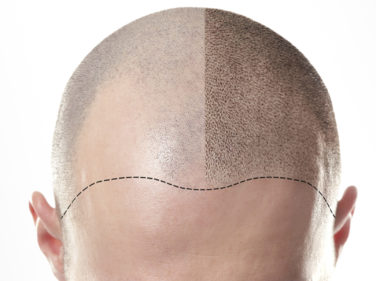Hair loss is often multifactorial. We’ll help you understand the cause of your hair (or scalp) loss problem, before recommending the most effective course of action. Our team will be with you every step of the way to guarantee you the most satisfactory results.
FUE hair transplant
Hair micrografting (FUE) is the only technique that can provide a natural, permanent solution to the problem of baldness in both men and women.
Read more
PRP hair treatment
PRP (or Platelet Rich Plasma) uses the growth factors present in the blood to stimulate hair regrowth. PRP is a patient-specific component, obtained by blood sampling and centrifugation, which presents no risk of allergy or rejection.
Read more
PRP + stem cells
In certain indications, PRP (or Platelet Rich Plasma) can be injected with a complement of stem cells, taken from a fat sample. This fat is purified and then combined with PRP. The resulting serum contains around 50% fat cells and 50% PRP.
Read more
Frequently asked questions
What causes hair loss?
Hair loss can be explained by many factors, resulting from a combination of both internal and external factors. Internal factors Among internal factors, genetics play a major role.
Androgenetic alopecia, also known as baldness, is hereditary and affects both men and women.
Internal factors also include hormonal imbalances, particularly in women during pregnancy or menopause.
Hair loss can also occur temporarily during periods of physical or emotional stress.
Hair loss can also be due to nutritional deficiencies, where a lack of nutrients weakens the hair.
Similarly, certain illnesses, whether chronic or autoimmune, can cause hair loss.
Finally, the consumption of certain medications, such as those used to treat cancer, can have the side effect of hair loss. External factors Among external factors, the excessive use of aggressive hair products or inappropriate hair care contribute strongly to hair loss.
Exposing hair to heat (straightening, blow-drying, etc.) also makes it more fragile, as does overly tight styling, which can lead to traction alopecia.
How can you prevent hair loss and improve hair quality?
To prevent hair loss, it’s important to understand the causes and address the underlying problem.
In general, it’s always advisable to start by using appropriate hair care products, remembering to massage your scalp regularly, and avoiding overly aggressive products.
On a day-to-day basis, adopting a balanced diet, learning to manage stress and getting a good quality of sleep can greatly reduce hair loss.
Food supplements can also be an interesting solution.
To improve hair quality, it’s important to take care of your hair with appropriate nourishing and moisturizing treatments.
You should also detangle your hair gently, using a soft bristle or wide-tooth brush.
Regular trimming is also highly recommended to get rid of split ends.
How do I choose the right beauty treatment for my hair?
Choosing the right treatment for your hair loss is an important step, during which it’s crucial to ask yourself the right questions.
The right treatment for you will be the one that best meets your needs and expectations.
The first step is to assess the nature and stage of your hair loss.
If hair loss is relatively moderate, a PRP treatment may be beneficial, while a hair transplant will be necessary if the stage of hair loss is too advanced.
It’s also important to consider your treatment goals and preferences. Hair transplantation will offer an effective, long-lasting change, but will be more invasive, while PRP and PRP + stem cells may require several sessions to be optimal, but are non-invasive solutions.
All these criteria, as well as your budget, should therefore be taken into account when choosing your aesthetic hair treatment.
What are the possible side effects of hair treatments?
Side effects after a PRP-type aesthetic hair treatment are generally minor and temporary.
They may include slight pain, swelling or redness.
The treated area may also be sensitive for a few days.
Itching and bruising may also occur.
Are hair treatments suitable for all hair types?
Hair treatments are generally suitable for all hair types. Whether fine, thick, straight, curly or frizzy, they can work for all hair types.
However, their effectiveness depends above all on the condition of the hair follicles and the underlying cause of hair loss. If the follicles are still present, albeit weakened, then PRP or PRP + stem cell treatments will be suitable.
On the other hand, if the loss is too advanced, hair transplantation is more effective.
At your first consultation with a specialist, he or she will help you to determine the most appropriate solution for the condition of your hair.
Are combination treatments more effective for hair loss?
Combination treatments are known to maximize the effectiveness of results, although one treatment alone may suffice.
Hair mesotherapy, for example, which involves injecting vitamins, minerals and other active ingredients into the scalp, is often used to complement other treatments.
In this case, mesotherapy maximizes the benefits of the initial treatment by delivering nutrients to the hair follicles.
At Claris Clinic, we also offer PRP treatment combined with stem cells.
While PRP helps stimulate hair regrowth, stem cells will help regenerate damaged hair follicles for even longer-lasting results.